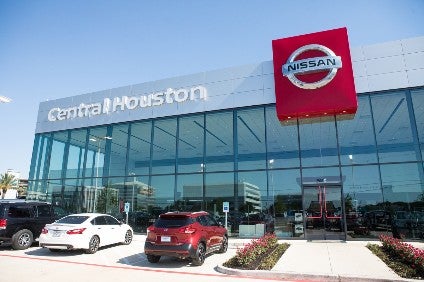Light vehicle sales in the US fell nearly 39% in March compared with last year. The sharp drop to US vehicle sales last month was widely expected as social distancing and lockdown measures took hold in the US in response to the COVID-19 public health emergency.
The COVID-19 crisis is causing unprecedentedly large government-induced recessions across the world, with new car sales and the automotive sector hit particularly hard. In the US we have seen a sharp rise in those claiming unemployment benefits and people have less money – or indeed the inclination – to spend on new cars and trucks. Dealerships are shut or empty.
The next few months are expected to be particularly weak for vehicle sales in the US, but the picture is forecast to brighten later in the year as economic activity returns and population movement controls are gradually relaxed.
GlobalData forecasts in its base case scenario that the US light vehicle market in 2020 will be 14.7 million units – a drop of almost 14% on 2019’s total. That forecast assumes a strong pick-up to vehicle sales in the third quarter. We see that as a plausible central case (something of a natural market rebound after the fallow period) for now, but it does assume the public health crisis is brought sufficiently under control to allow a significant easing of restrictions by late summer.
With interest rates staying low, there will also be some spectacularly good deals around for consumers later this year as vehicle manufacturers strive to recover volume. That said, consumers will also be wary of taking on more debt.
One bright spot for the auto industry in the longer term is that the crisis has reinforced the value for many households of owning an on-demand and available 24/7 car that plays a critical role in daily life. The rapid rise of ride-hail disruptors and the notion of happily renting or sharing assets with strangers may be curtailed for a while. Previous investor darlings like Uber and Lyft have been among the losers in this crisis. They will respond of course, but social distancing doesn’t sit at all well with car sharing.
In the long-term, depleted vehicle markets will come back. As the vehicle parc ages, replacement demand will eventually return after a period of purchase deferment. The big question – and one that generally hangs in the air with this uncertain COVID-19 crisis – is how long that period of deferment will last and how the automotive industry and its companies are equipped to manage it? At the very least, they will have to redraw their operational plans for the next eighteen months and re-order their strategic priorities as they emerge from the crisis to face a changed business landscape across the world.
In the short-term, the pressures on volumes and profitability will continue to be acute. OEMs opening credit lines to boost their financial positions quickly is a sign of how serious things have become, so rapidly. The crisis will eventually pass of course, but it will have wrought some damage and won’t be easily forgotten.







